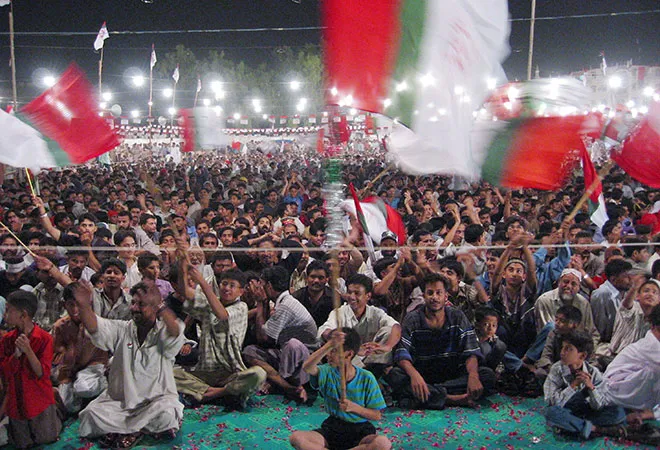
On 18 June, an antiterrorism court in Islamabad closed a final chapter in the history of the Muttahida Qaumi Movement (MQM), a political party that once represented Mohajir nationalism, lorded over urban areas of Sindh province, including Pakistan’s economic heart Karachi, and was a force to reckon with in national politics.
The court sentenced three men to life in jail for the murder of MQM leader Imran Farooq in London in 2010. More significantly, the court held the MQM’s supreme leader Altaf Hussain responsible for it, having been ordered the fatal hit of the man who once was his trusted lieutenant and the party’s chief ideologue.
Imran Farooq, 50, was a founding member of the MQM along with Hussain in 1984. Both had been living in exile in London since the 1990s as criminal cases were registered against them in Karachi, which they claimed were politically motivated. For two years before his death, Farooq had been politically inactive as Hussain marginalised him as serious political differences cropped up between the two.
The MQM supreme leader, Altaf bhai (brother) to supporters, had run the party’s affairs as a capo, brooking no dissent either within the party or media, even as street power, intimidation and a militant operating style maintained the party’s electoral supremacy.
Mohajirs are the Urdu-speaking segment of Pakistan’s population, whose elders migrated from India during Partition in 1947. Their concentration is primarily located in urban part of Sindh. The MQM had been the flagbearer of Mohajir nationalism in Pakistan since the party’s founding in 1984 until 2016. The MQM supreme leader, Altaf bhai (brother) to supporters, had run the party’s affairs as a capo, brooking no dissent either within the party or media, even as street power, intimidation and a militant operating style maintained the party’s electoral supremacy. The party had the power to bring Pakistan’s main financial centre to a halt within minutes on flimsiest of pretexts.
From 1988 to 2013, elections in Sindh had underlined the MQM’s supremacy in Karachi, Sukkur and Hyderabad, its main urban centres. This ensured the party could weather its vacillating relationship with the military establishment which had, from 1992 to 1999, thrice launched full-fledged operations aimed at cleaning up the urban centres of Sindh, mainly Karachi, of violence and criminality, driving first Hussain and later Farooq to flee the country and live in exile in London. Hussain continued to run the party from London with an iron grip. However, those operations could not end a culture of impunity surrounding rampant political murders, kidnapping, extortion and gang warfare. Gun running aggravated by Pakistan’s involvement in the conflict within Afghanistan made the situation in Karachi murkier.
Yet, the party’s electoral numbers also helped it do good turns from 1988 to 2013 as governing allies the PML (N) and PPP, the nation’s leading parties, who overlooked the MQM’s history of strong-arm politics and made it part of ruling alliances with the military establishment’s grudging consent. During the autocratic rule of Gen. Pervez Musharraf (1999-2008), himself a Mohajir, the MQM made itself an ally of the military government and became one of its staunchest supporters, especially of the post-2001 war against jihadi terror that the regime selectively waged to please the United States. After democracy was re-established in 2008, the party became a ruling partner of the PPP. However, the MQM became in opposition both at national and provincial levels in 2013, when no national party needed MQM support to form a government in Islamabad or Karachi.
The party’s electoral numbers also helped it do good turns from 1988 to 2013 as governing allies the PML(N) and PPP, the nation’s leading parties, who overlooked the MQM’s history of strong-arm politics and made it part of ruling alliances with the military establishment’s grudging consent.
It is widely believed Farooq, who himself had a reputation for ruthlessness, was eliminated because Hussain perceived a potential challenger to his leadership. Media reports at the time had obliquely referred to his involvement in the murder, for which he was formally booked in 2015. Now, the court has confirmed that the act of abettors and executors was “preconceived with a design to intimidate and overawe the public in general and workers of MQM in particular so that in future no one can raise voice against Altaf Hussain, the leader of MQM.” In 1993, Azeem Ahmed Tariq, chairman of the MQM was another co-founder, was mysteriously murdered in Karachi, as he was suspected of becoming an alternative power centre after Hussain went into exile the previous year.
Farooq’s death brought to the open cracks in the MQM leadership and Hussain’s halo began to slip after he was formally booked in the murder case in 2015. However, the tide did not turn definitely against him until August 2016, when he delivered a doomed speech over phone to a crowd in Karachi that eventually undid — with a little prodding from the military establishment eager to cut the MQM to size — the movement he built since his student days in the 1970s as his personal fief.
All hell broke loose after 22 August 2016 when Hussain delivered the speech (in which he cursed Pakistan as the nightmare for Mohajirs and called it “cancer for the entire world” and “the epicentre of terrorism”). The speech was a bombshell in Pakistan’s politics, leading to the party’s implosion. Senior MQM leaders living in Pakistan such as Farooq Sattar disowned Hussain’s “anti-Pakistan” speech and the party later split into what are called the loyalist London and mainstream Pakistan factions, the latter a coalition member of the current Imran Khan-led government. Hussain is facing terrorism charges in Britain related to the August 2016 speech and was charged in October 2019.
Farooq’s death brought to the open cracks in the MQM leadership and Hussain’s halo began to slip after he was formally booked in the murder case in 2015.
The MQM grew out of the All Pakistan Mohajir Student Organisation (APMSO) founded by Hussain, a pharmacy student in the University of Karachi, in 1978. The issue of injustice meted out to the Urdu speaking students was exploited by APMSO. The issues that were raised by it were namely the quota-system, admissions and lack of employment opportunities.
After the first military operation in Karachi in 1992, the MQM was accused of conspiring with India to form a breakaway autonomous state to serve as a homeland for the Urdu-speaking Mohajir community. The alleged conspiracy is known as the Jinnahpur plot, which key army figures who led the operation later admitted as a fabricated case. But ever since the operation, the party became suspect in the eyes of the country’s all-powerful military establishment, which propped up a dissident group called MQM-Haqiqi that only heightened the vicious cycle of violence in Karachi without a meaningful impact on popular support. The MQM, which replaced Mohajir with ‘muttahida’ meaning united in its name in 1997 in a failed bid broaden appeal among other ethnicities, had often castigated that Two-Nation Theory, saying it satisfied nobody and it died in 1971 when the eastern wing of the country broke away to become Bangladesh.
No political party in Pakistan has had more ups and downs during the 11-year democratic interregnum (1988-99) following the end of Gen. Ziaul Haq’s military dictatorship than the MQM, thanks to its own militancy and distrust of the military establishment, which viewed the party as a violent enterprise and enemy agent. The irony is that Gen. Zia patronised the MQM as a counterweight to the Benazir Bhutto-led PPP in Sindh, which it did become in urban areas of the province. Hubris led to the party’s downfall. Hussain is now a spent force and his party that once dominated Sindh’s urban middle class finished, with a big void in it, Mohajir nationalism no longer a potent force it once was.
The views expressed above belong to the author(s). ORF research and analyses now available on Telegram! Click here to access our curated content — blogs, longforms and interviews.




 PREV
PREV


